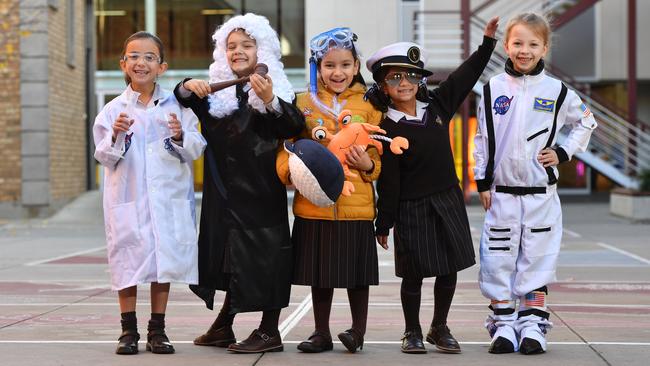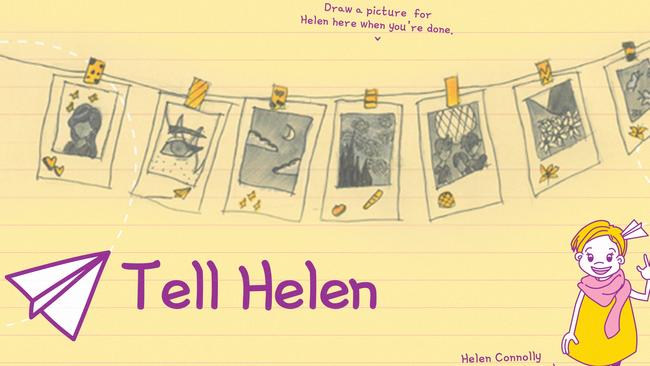Make career education a primary concern, says children’s commissioner
Children as young as eight say getting a good job is one of their biggest goals, according to a new research, which has prompted calls for career education to start in primary school.

Education
Don't miss out on the headlines from Education. Followed categories will be added to My News.
- Weatherill: Our childcare system is on the brink of collapse
- Are you getting the most from your Advertiser subscription?
Career education must start in primary school, the state’s leading child advocate says, after a survey of South Australian “tweens” revealed “getting a good job” tops their future aspirations list behind being a good person and travel.
Commissioner for Children and Young People Helen Connolly sought the feedback of more than 8400 children aged eight to 12 from across the state on their career goals in term four last year.

“We have children in Year 3 telling us that a career is what matters to them most and yet we don’t talk to them about it seriously until they’re in Year 10,” she said.
Ms Connolly’s snapshot report into children’s career aspirations, released tomorrow, shows that more than half of the children who responded said their dream job was in the arts, sports, working with animals, in health, or a Science, Technology, Engineering or Maths (STEM) field.
She said city tweens wanted to pursue jobs with a university qualification such as a scientist or engineer, while manual labour jobs – which didn’t even make the top 10 for suburban children – were standout areas of interest for country SA children.
“We know that jobs and careers are generally explored in the middle-senior years of school … however, many children often learn the basics about some jobs much earlier,” Ms Connolly said.
She said research had shown 80 per cent of Year 4 students could state with a degree of accuracy what type of work they wanted to do.
More formalised career education was needed earlier on in children’s lives, Ms Connolly said, to promote better long term engagement in learning and to debunk commonly held misconceptions about the types of jobs available to them, including gender stereotypes.


At inner city, all-girls Catholic R-12 school St Aloysius College, six-year-olds are being given the chance to gender-bend their concepts of women and men in the workplace and learn about all types of careers available to them.
SAC career counsellor Louise Murphy has for the past three years adopted a UK approach in career education, using art lessons for the school’s Year 1 students, who are visited by recent old scholars who have STEM-related careers.
More than 90 per cent of the Year 1 students involved have drawn women in traditionally male dominated industries.
By Year 3, SAC students prepare an oral presentation on future career goals in costume to their peers, with Year 8s by their side providing executive coaching – again a management role dominated by men.
“It’s a really powerful way of showing the girls from quite early on that they can do anything and to think outside stereotypes limited by gender, culture or geography,” Ms Murphy said.
A spokesman for the Education Department said high schools were encouraged to start formal careers education but primary schools were also encouraged to build learning about work life and career opportunities into lessons.
Stereotype madcap boffins turn kids off science
A wacky boffin with unkempt hair, wild eyes and wearing a white lab coat is a damaging stereotype that’s holding back a generation of potential scientists, a new study reveals.
Think of Dr Emmett Brown in the Back to the Future sci-fi movie franchise in the 1980s and ’90s; Dr Bruce Banner in Incredible Hulk and Dr Bunsen Honeydew and Beaker from TV’s The Muppet Show.
Research by the University of South Australia and Australian Catholic University shows that despite enjoying science, few kids are interested in pursuing it as a career because of their perceptions of scientists.
UniSA researcher Dr Garth Stahl and ACU researcher Dr Laura Scholes said understanding how stereotypes could influence children’s career aspirations – even at primary school level – was important in order to tackle the skills shortage in science, technology, engineering and maths (STEM).
The researchers interviewed 45 Year 4 students across six economically and geographically diverse schools and quizzed them what job they’d like when they grew up.
The children were asked whether they’d like to be a scientist; what kind of work a scientist did; and what a scientist might look like.
Most students (55 per cent) reported no aspirations to be a scientist and nearly 40 per cent said they “did not like” the subject, finding it “boring” or “weird”.
“Primary school is a time when kids are influenced by all sorts of stereotypes – through books, TV and movies,” Dr Stahl said. “In the case of science, media often shows scientists to be eccentric men in white coats.
“The notion of science being ‘weird’, ‘unusual’, ‘dangerous’ and ‘challenging’, is a barrier that we still need to tackle, with many kids feeling that a career in science could be too difficult or high-pressure for them to achieve.”
